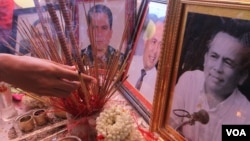The assassination of well-known social analyst Kem Ley took place in broad daylight in the center of Phnom Penh, but the mystery surrounding the murder and those involved may be revealed in a U.S. court.
The killing took place at a gas station owned by Caltex, a subsidiary of the California-based oil giant Chevron.
Kem Ley was loved and respected by many people inside and outside of Cambodia because of his staunch criticism of the Hun Sen government on many issues, such as illegal logging, corruption, and territorial integrity.
His last commentary before he was gunned down was on a Global Witness report on Prime Minister Hun Sen’s family’s wealth.
Ley was shot and killed while drinking his morning coffee on July 10. Police arrested Oeut Ang, 44, who claimed his nickname was Chuob Samlab, which means “Meet Kill” in Khmer.
Ang claimed that Ley owed him $3,000 and failed to pay him back, which prompted the revenge killing. Few believed his story, including Sam Rainsy, the former president of Cambodia’s main opposition party, who called the killing an act of “state terrorism.”
In August, Prime Minister Hun Sen filed a defamation complaint against Rainsy for the comments, which he posted on his Facebook page.
This gave Rainsy enough grounds to file a request at a U.S. court for Chevron to release the surveillance video footage from that day and any documents pertaining to possible government coercion.
The case is based on a statute called a “section 1782 discovery,” which stipulates that if an American company is involved in a legal proceeding outside the U.S., a litigant can apply to an American court for evidence that could be used in that proceeding.
The request was made by law firm BraunHagey & Borden to a court in the Northern District of California on behalf of Rainsy and other Cambodians.
“Now the truth has been covered up because those who did the bad things, especially killings, try to hide the truth,” Rainsy told VOA Khmer. “If it is revealed they would go to jail. Therefore, I have to reveal the truth and if the court in Cambodia is blind, doesn’t want to see the truth, and works to cover it up, I have to turn to a court in a democratic country that is independent and willing to find the truth for the victims.”
The requested documents and footage will also be used in a case where victims filed to the International Criminal Court in October 2014 for crimes committed by senior government officials, including crimes against humanity, serious human rights violations perpetrated by senior government officials, army officers, and government-connected business leaders.
On February 9, the court granted the firm’s request, allowing Chevron 30 days to object.
“The discovery sought does not appear to be unduly burdensome and appears to be appropriately tailored,” Judge Donna M. Ryu said in the order.
Chevron said as Chevron was not in possession of the footage there was no point in requesting they release it.
“The digital video recorder along with the recording it contained was removed by the police shortly after the incident,” said Chevron’s spokesman, Gareth Johnstone, in an e-mail to VOA Khmer. “And Chevron Cambodia Limited has no copies of the video recording.”
Eva Schueller, a lawyer at BraunHagey & Bordern, disagreed.
“It seems improbable that none of the station’s digital surveillance files were backed up in any way,” she said. “And were instead all entirely removed from the premises together with all of the recording equipment itself.”
Schueller said a subpoena was served to Chevron on Tuesday to seek multiple other materials, such as communications between Caltex employees and government officials, or with Chevron staff about the shooting, as well as information from any Caltex/Chevron employees or managers who may have reviewed the footage before handing it over to police.
Sam Rainsy, who has now resigned from the leadership of the Cambodia National rescue Party, maintained his stance on the government’s alleged involvement.
“The killings of Chea Vichea, Chhut Wutty, and Kem Ley have many things in common,” said Rainsy. “They were like a state-sponsored act of terrorism. Unless there is a participation from the authority, such a terrorism act would not be borne.”
“If the authority is involved in committing such an act of terrorism, it is very serious,” he added. “The situation in Cambodia is deteriorating; people are suffering because the authority takes part in committing terrorism on their own people.”
Richard Rogers, a lawyer who represents the Cambodian filers at the ICC, shared similar sentiment on the government.
"We suspect very strongly that the killing of Kem Ley was another example of political assassination,” he said in an e-mail. “Kem Ley spoke the truth about the human rights abuses perpetrated by the Ruling Elite. He was a hero amongst the poor and dispossessed. The Ruling Elite therefore had every reason to silence him."
The Phnom Penh court is scheduled to hold a hearing on Oeut Ang on March 1. But Kem Ley’s brother, Kem Rithsith, said he would not attend it if Ang is the only one to stand trial.
“I’d go if there are other witnesses or evidence released from security cameras to the public,” he said. “This is because my brother received lots of support and admiration from people, both in and out of the country.”
Ley’s spouse, Bou Rachana, will also not be able to attend the hearing because she has fled the country with her five children, fearing for their safety.




